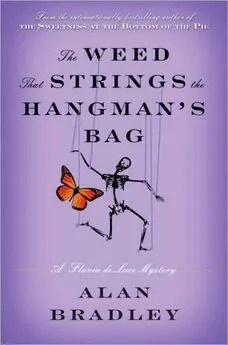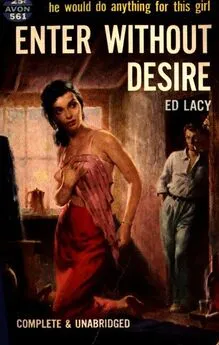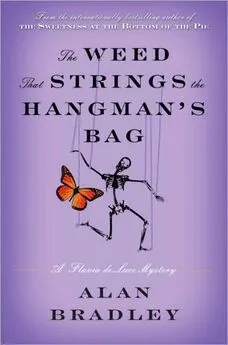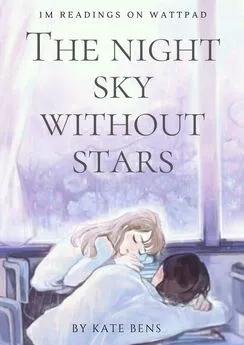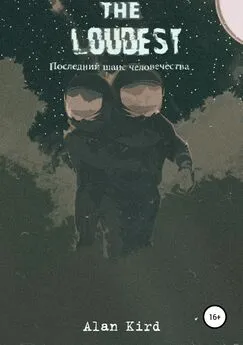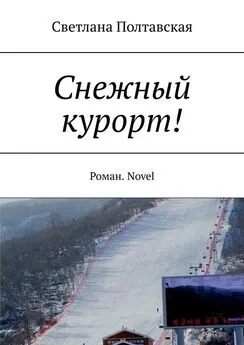Alan Bradley - A Red Herring Without Mustard: A Flavia de Luce Novel
- Название:A Red Herring Without Mustard: A Flavia de Luce Novel
- Автор:
- Жанр:
- Издательство:неизвестно
- Год:неизвестен
- ISBN:нет данных
- Рейтинг:
- Избранное:Добавить в избранное
-
Отзывы:
-
Ваша оценка:
Alan Bradley - A Red Herring Without Mustard: A Flavia de Luce Novel краткое содержание
A Red Herring Without Mustard: A Flavia de Luce Novel - читать онлайн бесплатно полную версию (весь текст целиком)
Интервал:
Закладка:
I had just stepped forward to have a closer look at the thing when something caught my eye: a gleam in a dark corner by the chimneypiece. I sucked in my breath, for there in Miss Mountjoy’s coach house stood Sally Fox and Shoppo—Harriet’s brass fire irons!
What on earth —? I thought. How can this be ?
I had seen the firedogs just hours before in the drawing room at Buckshaw. Brookie Harewood couldn’t possibly have crept back into the house and stolen them because Brookie was dead. But who else could have brought them here?
Could it have been Colin Prout? Colin was, after all, Brookie’s puppet, and I had found him hanging about the neighborhood just minutes ago.
Did Colin live here with Brookie? Miss Mountjoy had referred to Brookie as her tenant, which surely meant that he lived here. I hadn’t seen any sign of a kitchen or sleeping quarters, but perhaps they lay somewhere beyond the vast expanse of furniture or upstairs on the first floor.
As I retraced my steps to the central corridor, a car door slammed in the lane outside.
Crackers! It could well be Inspector Hewitt.
I ducked down and waddled my way towards a window, where I pressed myself flat against the back of a massive ebony armoire, round which I could peek out without being seen.
But it was not Inspector Hewitt who was coming towards the door: It was a walking bulldog. The man’s shirtsleeves were rolled to his elbows, revealing arms that, except for their excessive hairiness, might have been a pair of Christmas hams. His shirt, open at the neck, revealed a forest of black, springy chest hair, and his fists clenched and unclenched as he strode purposefully towards the door.
Whoever he was, it was clear that he was unhappy. The man was powerful enough to tear me open like a packet of cigarettes. I couldn’t let him find me here.
It was unnerving to work my way back through the maze of furniture. Twice I startled at a movement close by, only to find that it was a reflection of myself in an uncovered mirror.
The man was already opening the door as I reached the caged cubicle. I slipped inside—thank goodness for bare feet and straw on the floor!—then lowered myself to hands and knees, then flat on my face, and began to crawl through the narrow hole to the outside.
The rooster was on me like a champion fighting cock. As I crawled, I tried to keep my hands up to protect my face, but the bird’s spurs were razor sharp. Before I was even halfway through, my wrists were bleeding.
Up the wire wall I swarmed, the rooster throwing himself again and again at my feet and legs. There was no time even to think of what the wire mesh was doing to my toes. At the top, I threw myself over the wooden bar and dropped heavily to the ground.
“Who’s there?” Inside the coach house, the man’s voice sounded as if he was no more than a few feet away. But unless he got down on his belly and crawled, he could not follow me—could not even see me in the outside pen.
He would have to return to his car, then come round behind the coach house in the lane.
I heard his footsteps retreating on the wooden floor.
Again I made a crouching scuttle along the crumbling fence—but wait: I’d forgotten my shoes and socks!
Back again I went to retrieve them, my breath now coming in quick painful gasps. Once more along the fence and I ducked behind the hedge where I had left Gladys.
Just in time. I froze behind the box hedge—trying not to breathe—as the human bulldog went lumbering past.
“Who’s there?” he demanded again, and I heard the rooster throw himself at the wire mesh with a wild crowing.
A few more coarse oaths and my pursuer was gone. I cannot bring myself to record his exact words, but will keep them in mind against the day I can put them to good use.
I waited for a minute or two to be sure, then dragged Gladys from behind the hedge and set off for home.
As I pedaled along I did my best to look like a respectable English girl out for a bracing bicycle ride in the fresh air.
But somehow I doubted that my charade would convince anyone: My hands and face were filthy, my wrists and ankles were bleeding, my knees were scraped to the bone, and my clothing would have to be tossed in the dustbin.
Father would not be amused.
And what if, in my absence, they had discovered Porcelain in my bedroom? What if she had awakened and wandered downstairs? Or into Father’s study!
Although I had never before cringed on a bicycle, I cringed.
“I caught her crawling in at one of the windows of the picture gallery,” Feely said. “Like a common housebreaker. Can you imagine? I’d gone there to study the Maggs painting of Ajax, and—”
Maggs was a ruffian painter who had lived in the vicinity of Bishop’s Lacey during the Regency, and Ajax a horse that had been bought on a whim by one of my ancestors, Florizel de Luce. Ajax had rewarded his new owner by going on to win enough races that Florizel was able to have himself elected to a rotten borough.
“Thank you, Ophelia,” Father said.
Feely cast down humble eyes and drifted out the door, where she would sit on the chair in the hallway to eavesdrop comfortably upon my humiliation.
“Do you know what day it is, Flavia?” Father began.
“Sunday,” I said without hesitation, although yesterday’s fête at St. Tancred’s seemed as far removed in time as the last ice age.
“Precisely,” Father said. “And what have we done on Sundays since time immemorial?”
“Gone to church,” I replied like a trained macaw.
Church! I’d forgotten all about it.
“I’d thought to let you lie in this morning to recover from that nasty business in the Palings. Next thing I know, there’s an inspector at the door and you’re wanted for fingerprinting.
“Now I’m informed that there’s a dead body on the Trafalgar Lawn and that you’re nosing about the village asking impertinent questions.”
“Miss Mountjoy?” I ventured.
Give a little, learn a lot. That was going to be my Motto of the Month. I would have to remember to jot it down in my notebook.
But wait! How could Miss Mountjoy have known about the body on the lawn? Unless—
“Miss Mountjoy,” Father confirmed. “She telephoned to ask if you’d got home safely.”
The old harpy! She must have got up from her settee and been peering out through the trailing seaweed fronds of the willow tree, spying on my encounters with the rooster and the bulldog-man.
“How very kind of her,” I said. “I must remember to send her a card.”
I’d send her a card, all right. It would be the Ace of Spades, and I’d mail it anonymously from somewhere other than Bishop’s Lacey. Philip Odell, the detective on the wireless, had once investigated such a case, and it had been a cracking good story—one of his best adventures.
“And your dress!” Father went on. “What have you done to your dress?”
My dress? Hadn’t Miss Mountjoy described to him fully what she’d seen?
Hold on!—perhaps she hadn’t after all. Perhaps Father was still unaware of what had taken place at the coach house.
God bless you, Miss Mountjoy ! I thought. May you live forever in the company of those saints and martyrs who refused to tell them where the church plate was buried .
But wasn’t Father going to remark upon my cuts and abrasions?
Apparently not.
And it was at that moment, I think, it began to dawn upon me—truly dawn upon me—that there were things that were never mentioned in polite company no matter what; that blue blood was heavier than red; that manners and appearances and the stiff upper lip were all of them more important, even, than life itself.
“Flavia,” Father repeated, fighting to keep from wringing his hands, “I asked you a question. What have you done to your dress?”
I looked down at myself as if noticing the damage for the first time.
“My dress?” I said, smoothing it down and making sure he had a good view of my bloodied wrist and knees. “Oh, I’m sorry, Father. It’s nothing. I had a bit of a prang with my bicycle. Jolly bad luck, but still—I’ll rinse it out at once and mend it myself. It’ll be a piece of cake.”
My acute hearing detected the sound of a coarse snicker in the hallway.
But I’d like to believe that what I saw in Father’s eyes was pride.
 TWELVE
TWELVE 
PORCELAIN WAS SLEEPING THE sleep of the dead. I had worried in vain.
I stood looking down at her as she lay on my bed in much the same position as when I had left her. The dark swatches under her eyes seemed to have lightened, and her breathing was almost imperceptible.
Two seconds later there was a flurry of furious motion and I was pinned to the bed with Porcelain’s thumbs pressing into my windpipe.
“Fiend!” I thought she hissed.
I struggled to get free but I couldn’t move. Bright stars were bursting in my brain as I clawed at her hands. I wasn’t getting enough oxygen. I tried to pull away.
But I was no match for her. She was bigger and stronger than me, and already I could feel myself becoming languid and uncaring. How easy it would be to give in …
But no!
I stopped trying to fight her hands and instead took hold of her nose with my thumb and forefinger. With my last remaining strength I gave it a most vicious twist.
“Flavia!”
She seemed suddenly surprised to see me—as if we were old friends who had met unexpectedly in front of a lovely Vermeer in the National Gallery.
Her hands withdrew themselves from my throat, but still I couldn’t seem to breathe. I rolled off the bed and onto the floor, seized with a fit of coughing.
“What are you doing?” she demanded, looking round in puzzlement.
“What are you doing?” I croaked. “You’ve crushed my windpipe!”
“Oh, God!” she said. “How awful. I’m sorry, Flavia—really I am. I was dreaming I was in Fenella’s caravan and there was some horrid … beast! … standing over me. I think it was—”
“Yes?”
She looked away from me. “I … I’m sorry. I can’t tell you.”
“I’ll keep it to myself. I promise.”
“No, it’s no good. I mustn’t.”
“All right, then,” I said. “Don’t. In fact, I forbid you to tell me.”
“Flavia—”
“No,” I said, and I meant it. “I don’t want to know. Let’s talk about something else.”
I knew that if I bided my time, whatever it was that Porcelain was withholding would come spilling out like minced pork from Mrs. Mullet’s meat grinder.
Which reminded me that I hadn’t eaten for ages.
“Are you hungry?” I asked.
“Starving. You must have heard my tummy rumbling.”
I hadn’t, but I pretended I had, and nodded wisely.
“Stay here. I’ll bring something from the kitchen.”
Ten minutes later I was back with a bowl of food nicked from the pantry.
“Follow me,” I said. “Next door.”
Porcelain looked round wide-eyed as we entered my chemical laboratory. “What is this place? Are we supposed to be in here?”
“Of course we are,” I told her. “It’s where I do my experiments.”
“Like magic?” she asked, glancing around at the glassware.
“Yes,” I said. “Like magic. Now then, you take these …”
She jumped at the pop of the Bunsen burner as I put a match to it.
“Hold them over the flame,” I said, handing her a couple of bangers and a pair of nickel-plated test tube clamps. “Not too close—it’s exceedingly hot.”
Читать дальшеИнтервал:
Закладка:

